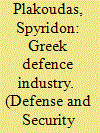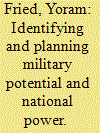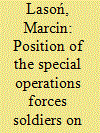|
|
|
Sort Order |
|
|
|
Items / Page
|
|
|
|
|
|
|
| Srl | Item |
| 1 |
ID:
190451


|
|
|
|
|
| Summary/Abstract |
Defence procurement in the UK has drawn a large degree of political and academic attention due to large-scale projects regularly being delayed and costing significantly more than the original estimate. The focus on contemporary defence procurement, however, suffers from one major drawback: a lack of historical contexualistation. This article redresses this imbalance between the focus on contemporary defence procurement and the problems faced purchasing military equipment in the past. The defence industry most representative of the contemporary procurement environment is the British aircraft industry in the inter-war period. This was an industry that was not publicly owned and presented dynamics that are comparable to today. This article explores the problems associated with twenty-first century defence procurement through this historical lens, demonstrating that many of the problems faced, and solutions proposed are not necessarily as new or innovative as has been claimed.
|
|
|
|
|
|
|
|
|
|
|
|
|
|
|
|
| 2 |
ID:
190452


|
|
|
|
|
| Summary/Abstract |
Greece was never internationally renowned for its defence industry; in fact, its state-owned industries were usually a source of headaches rather than income for Athens. The Debt Crisis (2008-18) compounded the chronic ills of the Greek defence ecosystem which appeared to decline irreversibly. And yet, in recent years they rebounded and reached new heights. How can this surprising turnaround be explained? And what does it indicate for the future of the Greek defence industry? This paper aspires to examine how the Greek defence ecosystem (state- and private-owned) evolved from a stage of stagnation and decline into a phase of stabilisation.
|
|
|
|
|
|
|
|
|
|
|
|
|
|
|
|
| 3 |
ID:
190454


|
|
|
|
|
| Summary/Abstract |
Research on the military potential/national power has focused on features such as numbers of soldiers, the military budget, population size, industrial production, technology, and others as underlying national power. The geopolitical situation of the State of Israel made the IDF General Staff the arbiter of any planning decision related to the development of the state economy, and responsible for planning and directing national security. Because the asymmetry between the military potential of the Arab countries and that of Israel was a reality on the ground that Israel’s national security concept had to take into consideration, and because modern warfare is between nations, their material forces and their mental capacities, the Israel Defence Forces [IDF] recommended setting up civil–military Planning Units based on military guidelines to identify, calculate and plan specific areas of national potential such as administration and regime, morale and education, static defence, the economy in wartime, and manpower.
|
|
|
|
|
|
|
|
|
|
|
|
|
|
|
|
| 4 |
ID:
190455


|
|
|
|
|
| Summary/Abstract |
The Multinational Joint Task Force (MNJTF) is engaged in active combat operations against Boko Haram in the Lake Chad Basin, but the latter remains very resilient and continues to launch lethal attacks. Yet, scholarship has failed to examine the institutional circumstances that account for the lack of success by the MNJTF. This article explores the influence of the counterinsurgency frameworks of the Organization of African Unity (OAU)/African Union (AU), Economic Community of West Africa States (ECOWAS), and the Economic Community of Central African States (ECCAS) on the operations of the MNJTF. It takes a critical look at how the MNJTF’s states’ affiliation to separate sub-regional blocs influences military and intelligence cooperation among them. The article argues that the AU, ECOWAS, and ECCAS institutional counterinsurgency frameworks severely limit military and intelligence collaboration among its member nations, therefore impeding the MNJTF’s operations.
|
|
|
|
|
|
|
|
|
|
|
|
|
|
|
|
| 5 |
ID:
190453


|
|
|
|
|
| Summary/Abstract |
Operations involving special operations forces are veiled in mystery, and public opinion is usually not well informed. The period of the last twenty years, beginning with the terrorist attacks of 09/11, has been no exception. But occasionally, official reports and the results of investigative journalism are published, very often criticising the actions of special operations forces soldiers. Given the secretive nature of special operations forces, researching these groups is challenging. The paper provides Special operations forces soldiers' views on the so-called global war on terrorism based on their views, observations, and experiences. There are individual opinions present in published testimonies of special operations forces members around the world. However, the research that includes a vast sample of seasoned, Polish special operations forces soldiers is an initial and original attempt to fill the gaps in the academic knowledge of the subject.
|
|
|
|
|
|
|
|
|
|
|
|
|
|
|
|
| 6 |
ID:
190456


|
|
|
|
|
| Summary/Abstract |
Polish border guards can’t stop a few dozen fast-wheeled APCs and IFVs. If such a force would cross through any road at the eastern border of Poland, it would pass almost intact. Afterward, it would be an easy target, but only before it could hide in a dense urban area. Is eastern Poland prepared for such a surprise attack of under a hundred vehicles that could arrive in many city centres within an hour after the border crossing? If a Russian force arrives at even a medium-sized city centre, they could occupy and hold such a position for weeks and use local civilians as human shields. They could force political negotiations holding also precious city infrastructure hostage. Lack of fast and decisive decision-making which is highly likely (because any bombardment will mean a loss of life of civilians) will only make any attempt to regain the city more difficult.
|
|
|
|
|
|
|
|
|
|
|
|
|
|
|
|
| 7 |
ID:
190450


|
|
|
|
|
| Summary/Abstract |
This study seeks to answer why Turkey could not reach its defense industry targets despite the efforts between 1919-1950. Defense industry was significant for the government's foreign policies and efficiency. The problems in defense industrial infrastructure and absence of a private industrial sector were significant reasons for falling of the empire. During Turkish Independence War and in early Republican Era, lack of national defense industry remained as a crucial problem. Thus the government considered the establishment of indigenous defense industry as a strategic target and invested limited resources. Despite, by the end of the World War II, Turkish Republic still failed to fulfil military requirements. This failure led Turkey to join NATO due to security requirements against USSR. It led to dependency on Western military assistance. Turkey's failure was due to lack of corporate planning, inadequate investment financing, and the difference between current human resources and strategic target requirements.
|
|
|
|
|
|
|
|
|
|
|
|
|
|
|
|
|
|
|
|
|